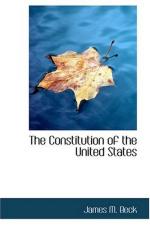Without this extraordinary provision for secrecy, which is so opposed to modern democratic conventions, and which so little resembles the famous point as to “open covenants openly arrived at,” the convention could not have accomplished its great work, for these wise men realized that a statesman cannot act wisely under the observation of a gallery, and especially when the gallery compels him by the pressure of public opinion to work as it directs. I recognize that public opinion—often temporarily uninformed but in the end generally right—does often save the democracies of the world from the selfish ends of self-seeking and misguided leadership; but, given noble and wise representatives, they work best when least influenced by the fleeting passions of the day.
It is evident that if the framers of the Constitution had met, as similar conventions have within recent years met at Versailles and Genoa, with the world as their gallery and with the representatives of the Press as an integral part of the conference, they would have accomplished nothing. The probability is that the convention would not have lasted a month if their immediate purpose had been to placate current opinion. It may be doubted whether such a convention, if called to-day, either in your country or mine, could achieve like results, for in this day of unlimited publicity, when men divide not as individuals but in powerful and organized groups, a constitutional convention would, I fear, prove a witches’ cauldron of class legislation and demagoguery. Is it not possible that modern democracy is in danger of strangulation by its present-day methods and ideals? Again the words of Washington suggest themselves: “If, to please the people, we offer what we ourselves disapprove, how can we afterwards defend our work? Let us raise a standard to which the wise and just can repair.”
Working with a sad sincerity and with despair in their hearts, this little band of men wrought a work of surpassing importance, and if they did not receive the immediate plaudits of the living generation, their shades can at least solace themselves with the reflection that posterity has acclaimed their work as one of the greatest political achievements of man.
The rules of order and the nature of the proceedings thus determined, the convention opened by an address by Mr. Randolph of Virginia, in which he submitted, in the form of fifteen points—nearly the number of the fatal fourteen—the outlines for a new government. He himself in his opening speech summarized the propositions by candidly confessing “that they were not intended for a federal government” (thereby meaning a mere league of States) but “a strong consolidated union.” Upon this radical change the convention was to argue earnestly and at times bitterly for many a weary day. The plan provided for a national legislature of which the lower branch should be elected by the people and the upper branch by the lower branch upon the nomination of




